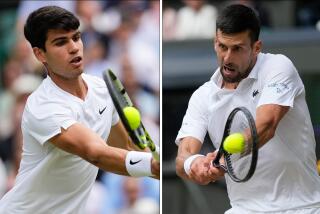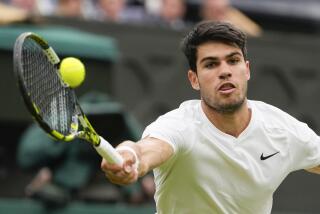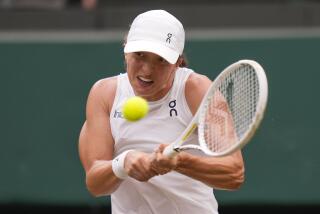Roger Federer continues to set opponents straight at Wimbledon, reaches quarterfinals
- Share via
Reporting from wimbledon, england — As is the case in virtually every Wimbledon news conference, top-seeded Roger Federer seamlessly shifted gears Monday by fielding and answering consecutive questions in English, French and German. He’s capable of doing the same in Swedish and Italian.
The defining characteristic of Federer these days is not his effortless eloquence, but his efficiency.
Federer has not lost a set in this tournament since 2016 — a streak of 32 in a row, the latest being his 6-0, 7-5, 6-4 victory Monday over Adrian Mannarino. The Frenchman lost the first set in a mere 16 minutes before putting up a bit more of a fight in the next two sets.
With that, Federer knocked off his 11th opponent of this streak and inched closer to his Wimbledon record of winning 34 consecutive sets between 2005-06, when he eclipsed John McEnroe’s mark of 31 in a row between 1984-85.
“I feel like these streaks just happen,” said the Swiss superstar, the defending champion and record eight-time Wimbledon winner who last lost a set here when he fell to Canada’s Milos Raonic in a 2016 semifinal.
“You can’t plan for them anyway because one point can change the outcome of a set. If you break it down, it could be one shot really. That’s not something you can always control. Of course, if you give yourself maximum chances, you’re playing well, you have super focus, then these streaks are kind of possible.”
Federer, who turns 37 next month, will play South Africa’s Kevin Anderson in the quarterfinals with a chance to break his record for consecutive sets won. But perfection is not the goal. Moving forward is.
“Look,” he said with a smile, “I’m equally happy if I would have won all the matches in four sets.”
On what’s annually regarded as the best day on the tennis calendar because of the quality of the matches, eight players in both the men’s and women’s brackets advanced to the quarterfinals. Novak Djokovic advanced with a 6-4, 6-2, 6-2 victory over Russian Karen Khachanov, and will face Japan’s Kei Nishikori in the quarterfinals.
Among the others to advance were Rafael Nadal and Federer, the world’s top two men’s singles players, who 10 years ago squared off in an unforgettable Wimbledon final that many people call the greatest match in the history of the sport. That classic, won by Nadal in five sets, is the subject of the just-released documentary “Strokes of Genius,” based on the Jon Wertheim book of the same name.
Federer and Nadal have a timeless rivalry akin to that of Bjorn Borg and McEnroe, or Chris Evert and Martina Navratilova.
“My theory is, they’re both the reason the other is still playing,” said Sports Illustrated’s Wertheim, a Tennis Channel analyst. “If Rafa’s knees gave in on him, I bet Federer would have retired by now. If Roger weren’t still here, I bet Nadal would be like, ‘Yeah, I’m done.’ I think they’re keeping each other in it. They’ve still got the other one in their sights.”
On Monday, Nadal breezed past Jiri Vesely of the Czech Republic, 6-3, 6-3, 6-4.
There’s a lot of tennis left to play, but it’s impossible to ignore the possibility of a Nadal-Federer rematch. The two have alternated as winners of the past six Grand Slam tournaments. They’re also miles ahead in the points rankings, with Nadal (8,770) and Federer (8,720) pulling away from the field. Germany’s Alexander Zverev is in third with 3,015 fewer points than Nadal.
Although Nadal is ranked higher, Federer is the tournament’s top seed because of his historic success on grass surfaces. This is the 16th time he has reached the Wimbledon quarterfinals.
“The thing with Roger is that he is making you work all the time, like, he’s not giving you any points,” said Mannarino, who won just five points in the opening set. “He’s returning all the time unless if you’re really, really serving well, but he pushes you to serve the best you can do.”
Nadal said the chance to play Federer in the final would be “something fantastic,” although he acknowledged it might not be the ideal outcome.
“If you ask me if I prefer another one, I say yes,” he said. “That’s the point. It’s about being smart, no? The overall goal is try to win the tournament.”
Follow Sam Farmer on Twitter @LATimesfarmer
More to Read
Go beyond the scoreboard
Get the latest on L.A.'s teams in the daily Sports Report newsletter.
You may occasionally receive promotional content from the Los Angeles Times.











